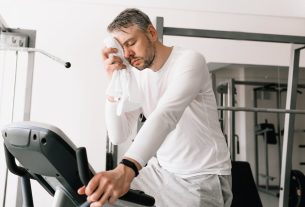This article contains spoilers for the current season of Celebrity Traitors.
When TV comedian Alan Carr was selected to be a traitor, his joy quickly turned to anxiety. He proclaimed he had a “sweating problem” – and that he wasn’t able to keep a secret. A less than ideal combination for him, but for viewers it’s TV gold.
Anyone who has ever been caught in a lie or found themselves in tense circumstances might have related to Carr. But why is it that so many of us sweat when we’re in stressful or uncomfortable situations?
Sweating typically happens for two reasons. One is when the body gets too hot. Sweating is our most effective method for reducing the body’s temperature. The other reason is emotionally driven and linked to psychological stimuli caused by anxiety, fear, pain or stress.
Humans have approximately 4 million sweat glands. There are two categories of sweat glands: apocrine and eccrine.
Eccrine glands make up around 90% of our sweat glands. These glands help cool the body. They respond to the release of a neurotransmitter called acetylcholine, which plays a central role in involuntary body actions, such as sweating.
The body has far fewer apocrine glands. These are mainly located around the nipple, armpits, face and genitals. These glands respond to a neurotransmitter called adrenaline. This neurotransmitter only becomes active when we’re in a “fight or flight” mode. The reason our palms sweat during these moments is because there are a high number of eccrine glands located there – so they go into overdrive when activated by adrenaline.
Adrenaline can also activate eccrine sweat glands in these high stakes situations, which means we begin to sweat all over our body.
The amount a person sweats varies from one person to another and is determined by a huge number of variables, including the number of sweat glands they have, the amount of adrenaline produced, how hydrated they are and their emotional state.
The amount that a person sweats during a stressful situation can also be made worse if they have a “sweating problem”, like Alan Carr does – such as the condition known as hyperhidrosis. This medical condition affects approximately 1%-3% of people in the UK – though in some countries it’s higher, with approximately 5% of the US population and as many as 16% of people in Germany affected.
There are two types of hyperhidrosis: primary and secondary. Primary accounts for 93% of hyperhidrosis cases. The cause of primary hyperhidrosis is unknown but genetic factors are thought to play a role – particularly because many with primary hyperhidrosis report having parents with the same diagnosis. It’s also theorised that hyperhidrosis may be caused the nerves that make us sweat being more overactive than they should be.
Read more:
Hyperhidrosis: the excessive sweating condition that could ruin your life
Secondary is usually caused by medications, particularly those that affect nervous system function.
People with hyperhidrosis can sweat at rates far above what’s considered normal. This is why the condition can have such a huge impact on quality of life and health.
People with hyperhidrosis are at greater risk of dehydration due to the amount fluid a person loses when they sweat – up to 5.8L an hour in some people. In comparison, people without hyperhidrosis only lose about 2L an hour when exercising.
They’re also at greater risk of fungal infections (such as athlete’s foot), bacterial infections (such as impetigo) and bad body odour as their warm, moist skin provides the perfect environment for microbes.
BBC/ Studio Lambert/ Euan Cherry
Hyperhidrosis and stressful situations may act as a self-perpetuating spiral. People with hyperhidrosis say the condition causes high physiological strain. High physiological strain causes sweating for everyone – but for people with hyperhidrosis, this is amplified, resulting in more sweating.
Prescription antiperspirants may help with mild to moderate cases of hyperhidrosis. If these don’t work, iontophoresis may be tried. This is where hands are placed in water with a small electrical current passing through to stop the sweat glands from working.
When these fail, botulinum toxin injections are administered directly into the armpit. The effects typically last around six months. This toxin blocks the action of acetylcholine preventing it from activating the sweat glands – thereby reducing their activity.
Stress sweat
In the context of The Traitors, sweating when we lie is primarily driven by the body’s nervous system which activates the “fight or flight” response during stress.
Read more:
The Celebrity Traitors: psychologist explains how to defend yourself when you’re accused of lying
Lying often evokes thoughts that are negative, especially if the lie induces anxiety or fear of being caught – thoughts the brain perceives as a threat. This activates the hypothalamus (a brain region which controls automatic body functions), which signals the adrenal glands on top of the kidney to release stress hormones – such as adrenaline. These hormones of course stimulate the eccrine sweat glands – especially those in the palms, feet and underarms.
Sweating itself doesn’t confirm deception. Rather, it reflects the psychological stress that triggered it. This sweat increase causes the electrical conductance of the skin to change, which is why lie detectors (polygraphs) measure galvanic skin response as a proxy for stress.
Read more:
Polygraph lie detector tests: can they really stop criminals reoffending?
But even these are not without issue because they cannot account for a person’s baseline sweat levels or how they adapt in stressful situations. It’s also important to note that not everyone can sweat – a condition known as anhidrosis – so a polygraph would probably not work in these instances.
Sweating is an involuntary process that happens when we’re stressed or under pressure. So whether you’re a Traitor or Faithful, there’s not much you can do to stop the sweat when facing interrogation at the round table.



